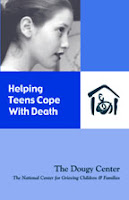 I put two sympathy cards in the mail this week. As usual, I tried to pick out something appropriate for a grieving wife and for a grieving husband. In each one, I took time to write a short paragraph that conveyed a personal memory of the person who had died.
I put two sympathy cards in the mail this week. As usual, I tried to pick out something appropriate for a grieving wife and for a grieving husband. In each one, I took time to write a short paragraph that conveyed a personal memory of the person who had died.I almost wrote "the person who had passed."
You'd think I'd get past the language issue, considering that I'm on the board of The Dougy Center, the pioneering nonprofit whose mission of serving grieving children and their families has been replicated around the globe. Yet the right words seldom, if ever, come easily in situations where someone has died.
I guess that's why I greatly appreciated the video that we watched at the end of our most recent board meeting last week. "Helping Teens Cope With Grief" is a locally produced DVD that features six teenagers -- five girls and a guy, ages 13 to 18 -- who have been in the Dougy Center's peer support groups. (The DVD isn't out yet, so I posted an image of a similarly titled book, one of a dozen also produced by the center.)
I was blown away by the wisdom, maturity and poise exhibited by the six teenagers. Four lost a parent to cancer, so they what was coming. The other two, though, had to deal with the shock of a fatal heart attack and a suicide, respectively.
In the space of 20 minutes or so, they confronted a half dozen topics with complete honesty: -- How they learned of their parent's death.
-- Coping with life after death.
-- When the surviving parent begins to date.
-- Changes in general (friendships, teacher relationships, etc.)
-- What grief looks like.
-- How you can help.
Each of the teenagers had something of value to say. And while they didn't parrot each other, they spoke of universal truths. For instance:
-- Losing a parent at a young age makes you grow up really fast. It's not unusual to become "the man of the house" or "the woman of the house" depending on which parent has died.
-- You tend to have fewer but closer friends. Some people just disappear fromyour life.
-- Grief lasts forever. Your dad is never coming back. Your mom is going to miss your birthday, your wedding, the birth of your first child.
-- You can help by just listening. Don't offer advice, unless asked. Let us cry, let us be sad. Understand we may change from day to day.
-- Remember to ask about the person who died, too.
-- Understand there are times we may want to grieve alone.
I was struck by the simplicity of their words andthe power of their insights. Listening to them and watching their composed faces -- allowing us into their lives -- made it feel as if I were receiving a gift. And for me, who has yet to lose either parent, these three quotes stayed with me the longest:
"I think differently. I think about life and death. It's the realization of how vulnerable we are."
"Even when the wound heals, there's still a scar. There are still things going on below the surface."
"Things do get better. But there's always going to be one puzzle piece that's missing."
No comments:
Post a Comment